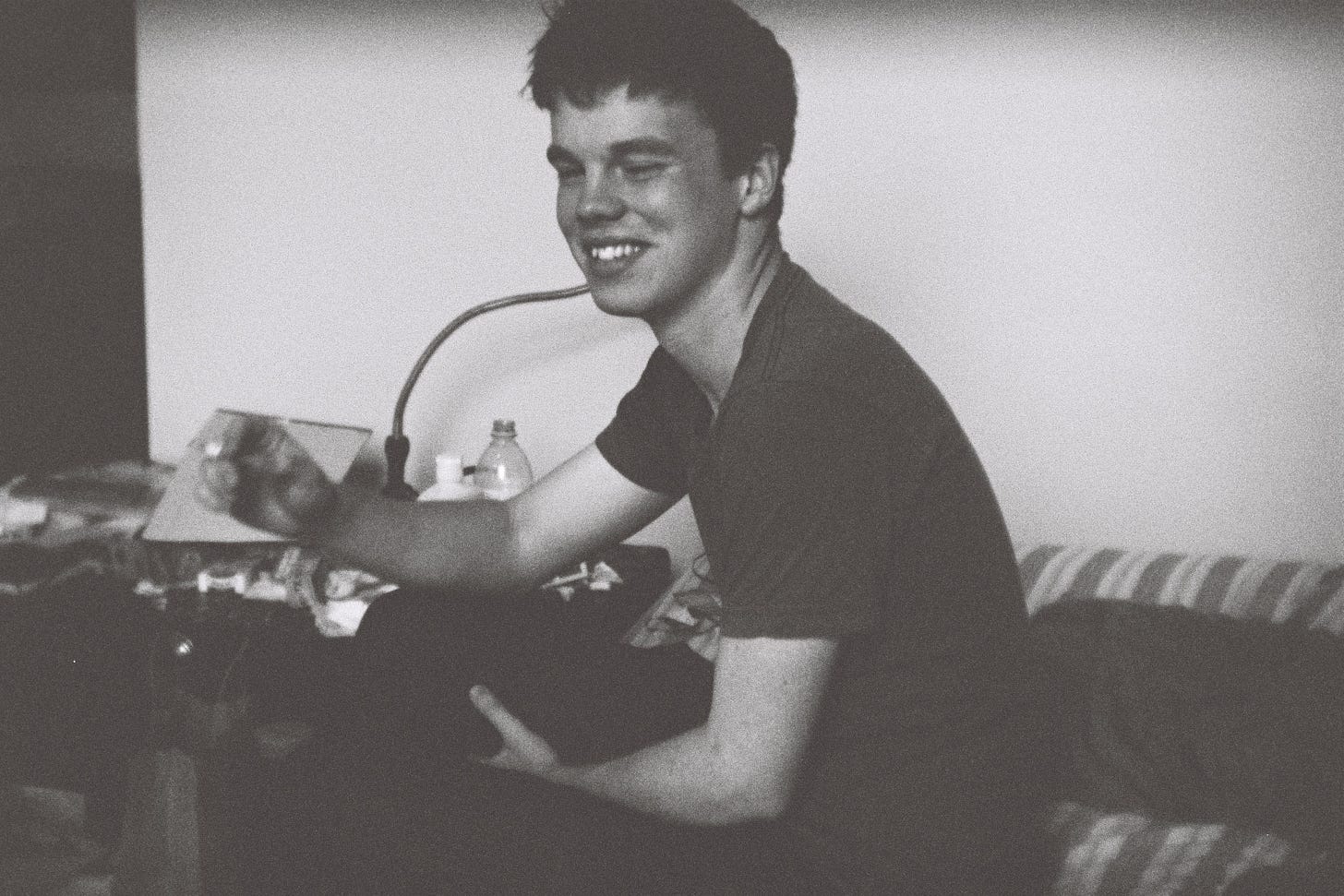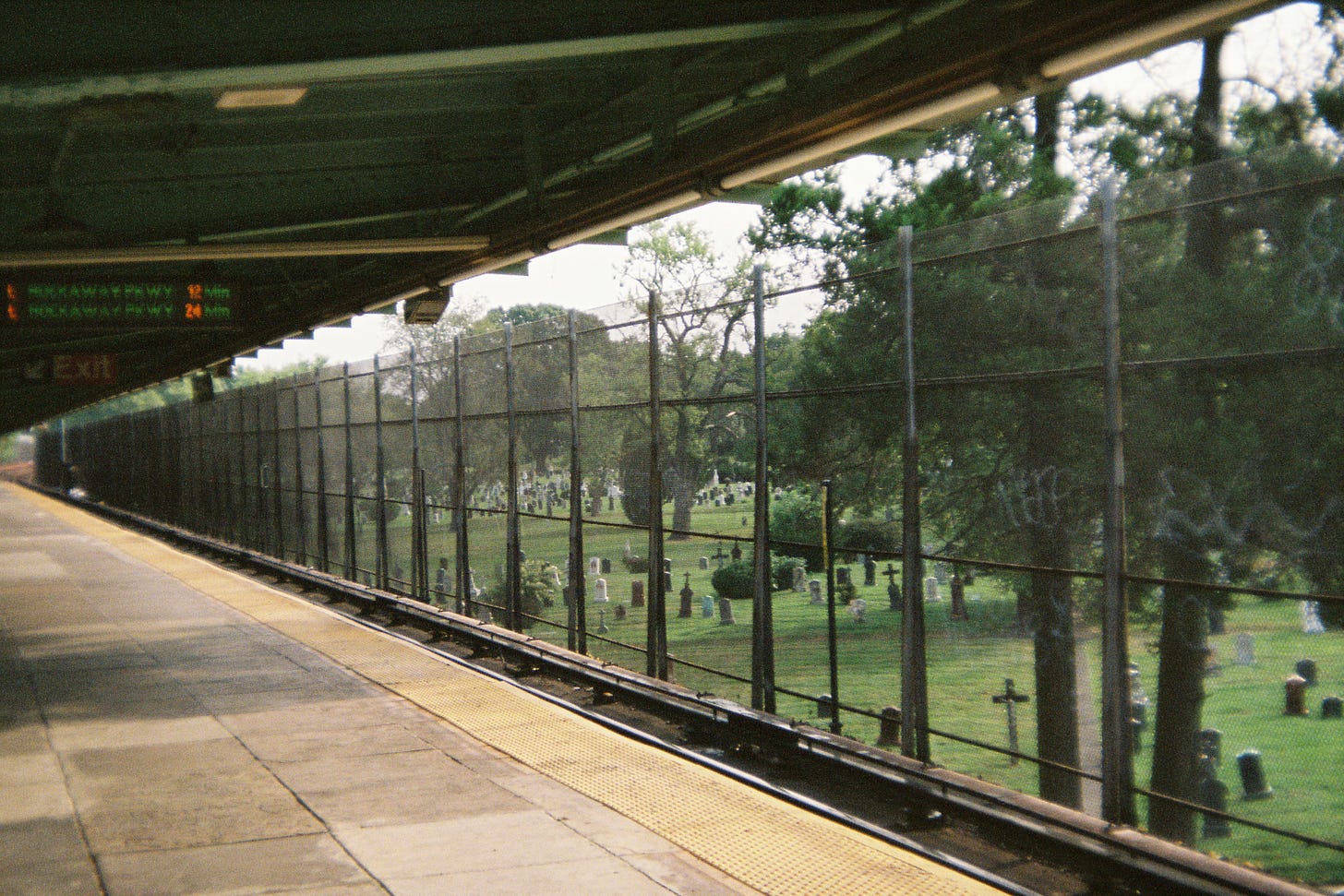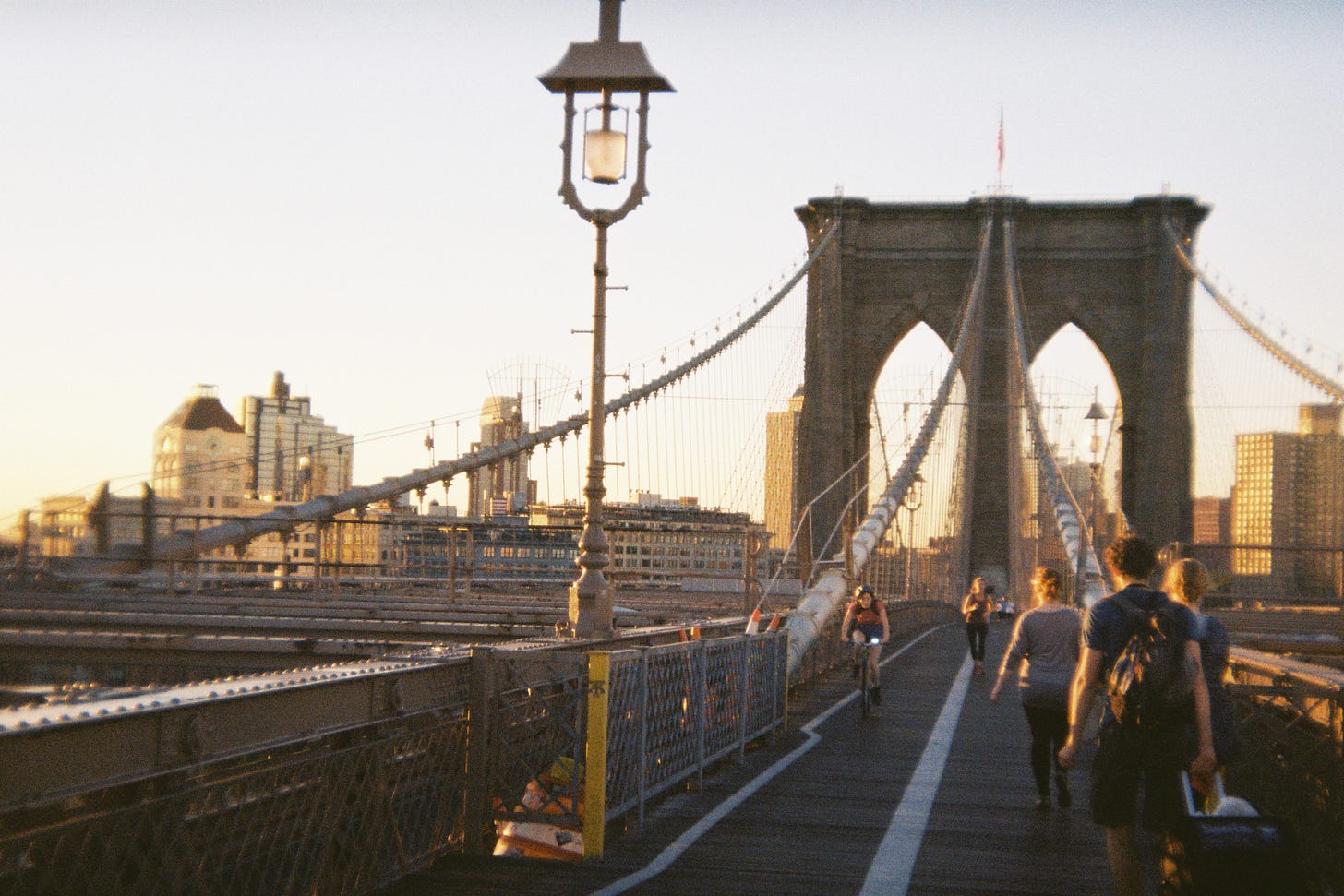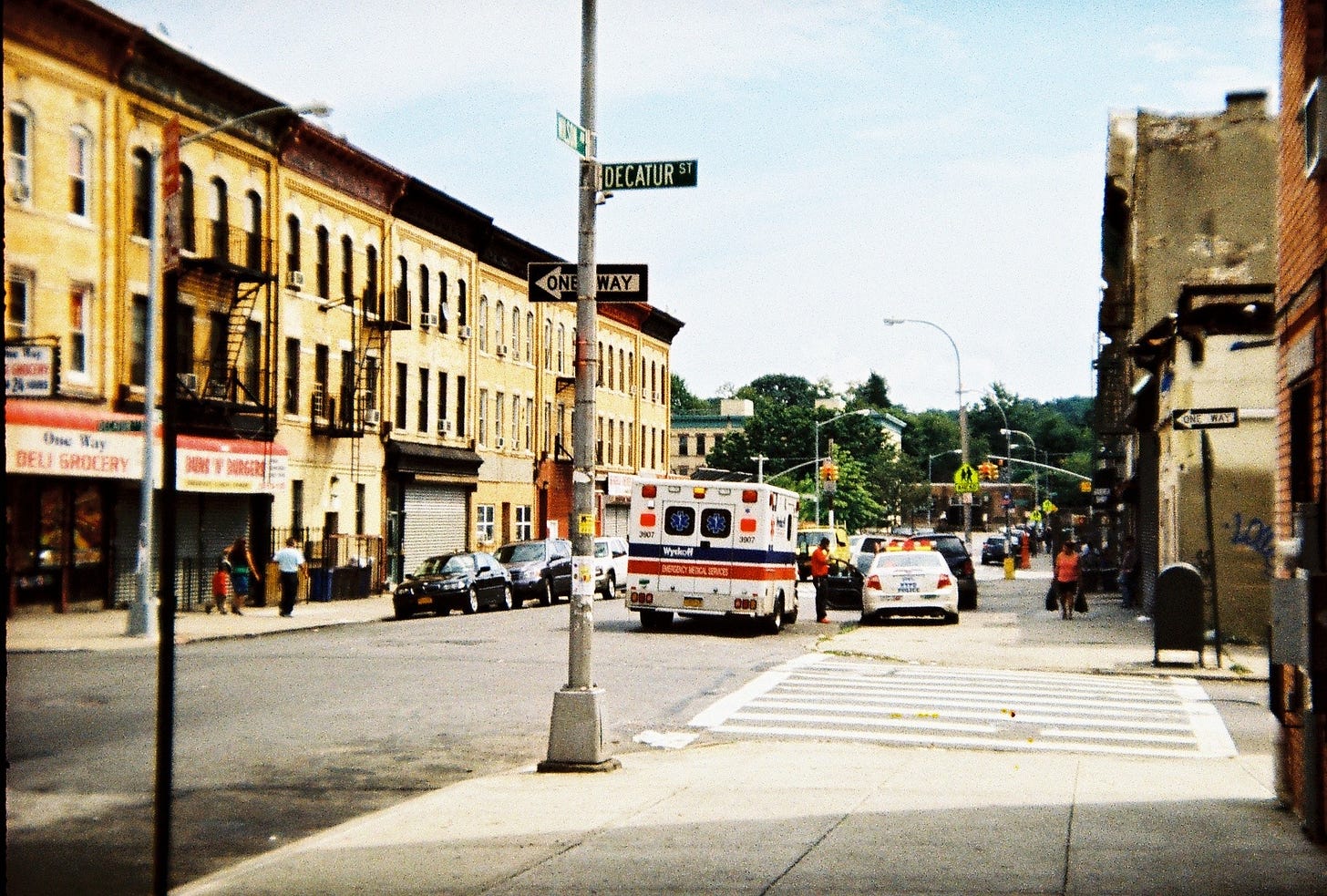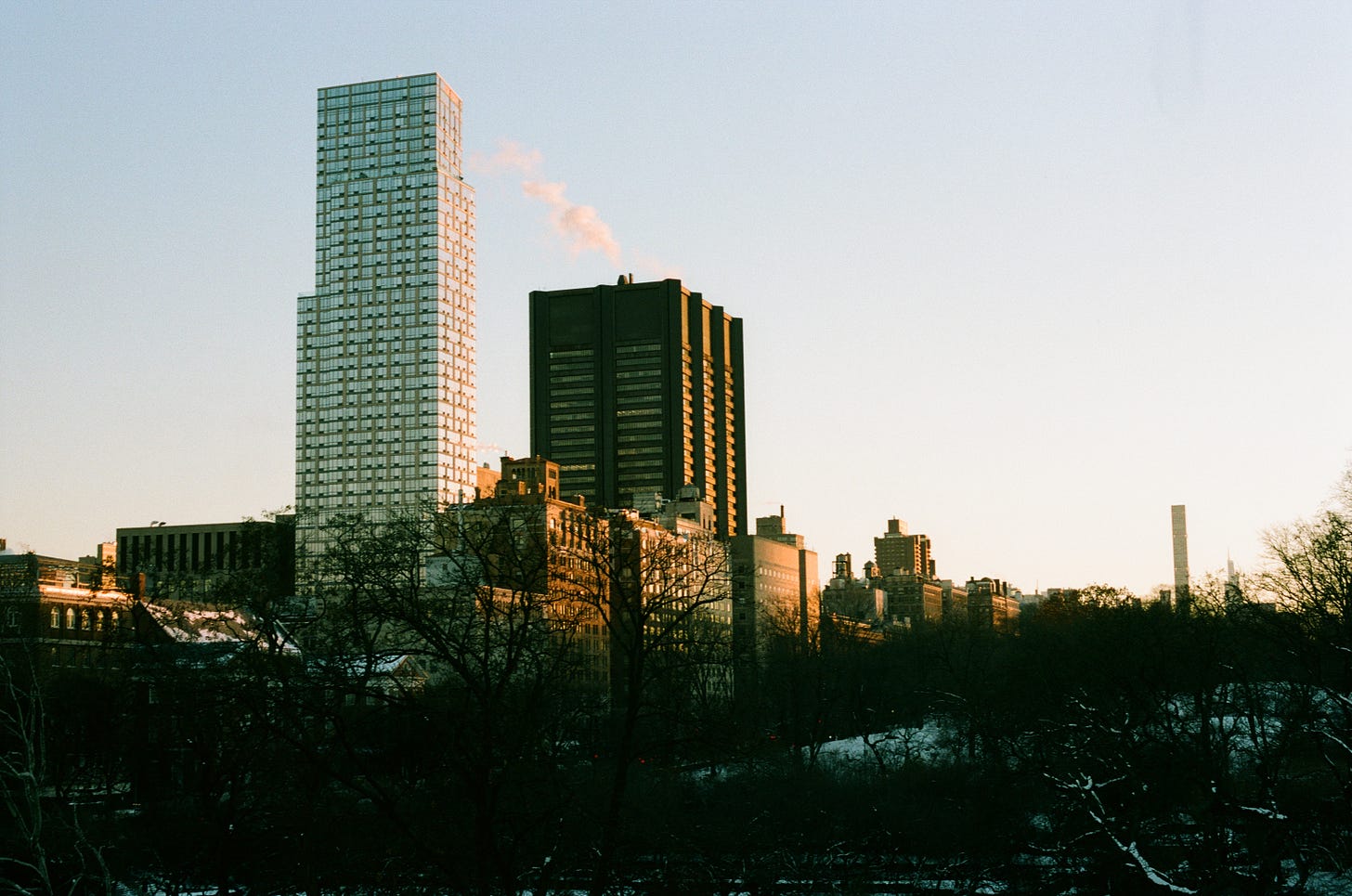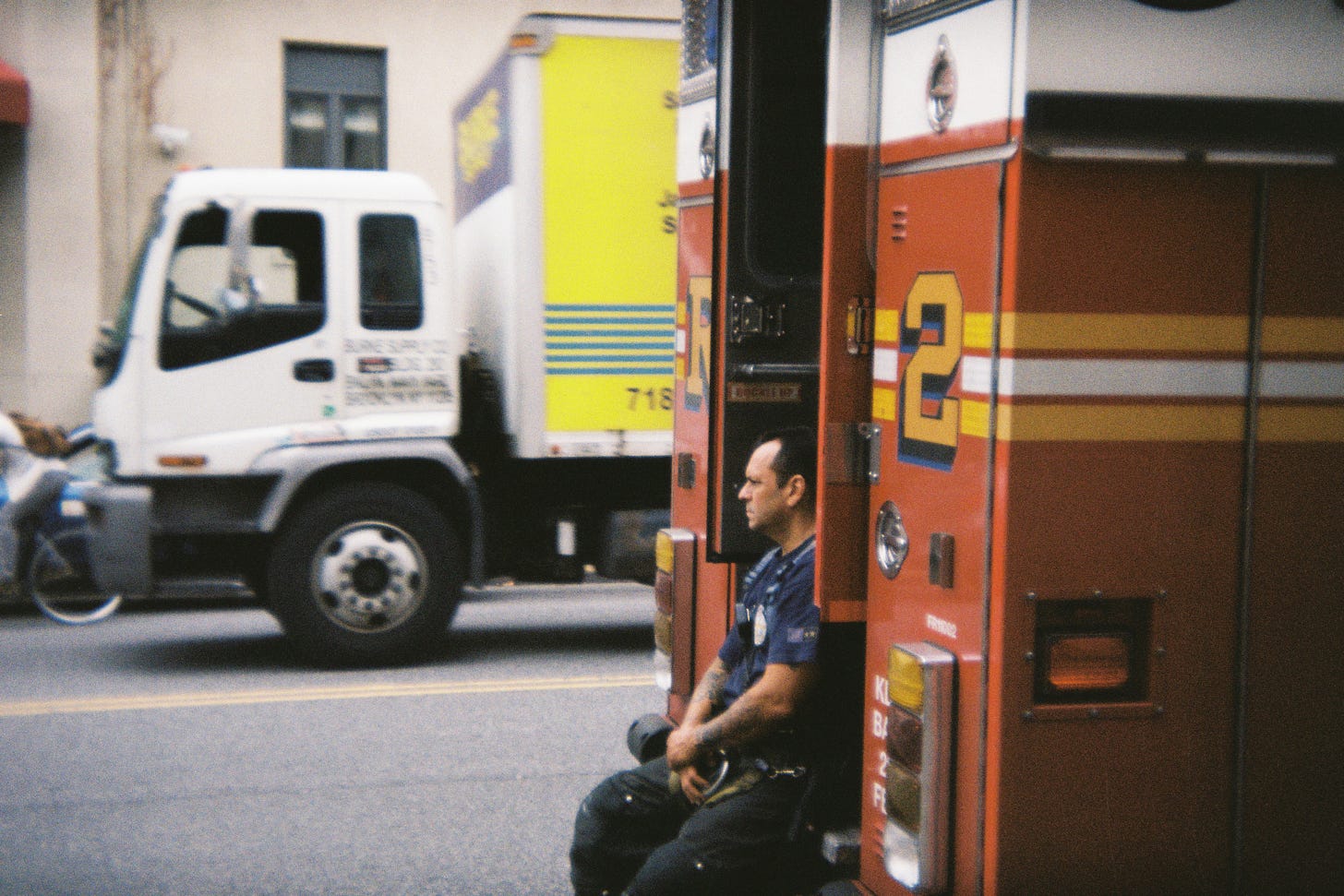#9 - Everything's Singing!
New York 2012 and 2021
But New York cares
- Interpol, NYC
It was a strange time to be in New York. It always is. As a very dumb twenty-one-year-old I got a J1 work visa to come for a summer to the United States. Most people I knew then went to Boston or San Diego. I went to New York with a few others and slept on a bedroom floor in Morningside Heights, then after a month moved out to Bushwick by myself. While there I walked for hundreds of hours up and down the avenues and streets of Manhattan, ambled around Brooklyn and paid brief fleeting visits to Queens and Staten Island. I did not at any point gain, or really seek, employment. I burned through what savings I possessed and then borrowed some, frittering it away on fourteen-dollar packets of cigarettes and six packs of Brooklyn Lager and one enjoyable but fiscally irresponsible trip to Six Flags Massachusetts.
- 2012
New York is a rare city, you can grow up on the other side of an ocean and still have some cultural idea, some opinion of it. When I was seventeen my mother let me skip school on the day Grand Theft Auto 4 was released. You play an immigrant of vague European origin in a lightly fictionalised New York City. It was made by Scottish people. I played it from dawn to whenever I passed out, driving the imaginary streets and living an imaginary life. At fourteen I stood in a dull supermarket in South Dublin and listened on my Creative Zen Nomad to Interpol’s Antics and never imagined that the city it was made in also had dull supermarkets, and wet, gloomy Sundays and edgy, grey boredom.
New York, you're perfect
Oh, please don't change a thing
Your mild billionaire mayor's
Now convinced he's a king
LCD Soundsystem, New York I Love You, But You’re Bringing Me Down
It was ten years after 9/11, when the city that the rest of the country had hated suddenly became an emblem, willing or unwilling, of America. You couldn’t move for the lamentations of the nostalgic. New York was safe, too safe, and boring now under the technocratic regency of Mike Bloomberg. Then a few months after I was there, Hurricane Sandy flooded the streets, knocked out the subway and totally reshaped the city's relationship to its environment.
- 2012
New York is older
Shedding its skin again
It dies every ten years
And then it begins again.
- The National, Born to Beg
This was not the New York of Robert Mapplethorpe and Joni Mitchell, not the one on the cover of The Freewheelin’ Bob Dylan, not the one of CBGBs (closed in 2006) or even the one depicted in Lizzy Goodman’s Meet Me in the Bathroom, the oral history of the last time New York was officially cool. That era, of the Strokes and all their imitators, ends in the book's reckoning, some time in 2011. Mars Bar, the lower East Side spot with the worst toilets in the city, closed around then, too. I would have lamented it, but of course I had never heard of the place. The old New York is dying, the new one struggles to be born etc etc. Every city has cycles of death and rebirth, but New York’s are different, because you have to read essays about them.
New York is a city in which everything imaginable is happening and you are not invited to any of it.
- A friend
- 2012
As a J1er you are a fleeting fixture, not permanent or prominent enough to be loathed. My experience was fairly solitary, and it felt as if I only ever met the oddest Americans imaginable. I walked the streets feeling sorry for myself and listening to James Vincent McMorrow’s Early in the Morning on hard rotation, to the extent that my memories are soldered to the songs. I’m listening to it right now. There is a YouTube video called A Year In New York from 2011 set to one of the tracks on the album that held a grip on me when I lived there. It was a minor viral hit, for whatever that meant back then, and it’s still a lovely bit of work. What it evokes more than anything is that sense of the secret, unknowable lives being lived by everyone else around you.
It is necessary to find one's own way in New York. New York City is not hospitable. She is very big and she has no heart. She is not charming. She is not sympathetic. She is rushed and noisy and unkempt, a hard, ambitious, irresolute place, not very lively, and never gay. When she glitters she is very, very bright, and when she does not glitter she is dirty. New York does nothing for those of us who are inclined to love her except implant in our hearts a homesickness that baffles us until we go away from her, and then we realize why we are restless. At home or away, we are homesick for New York not because New York used to be better and not because she used to be worse but because the city holds us and we don't know why.
- Maeve Brennan
I thought of, and discarded, several schemes to get a job, to make some money, to do something, anything at all. I was going to be a personal assistant to someone powerful. I was going to dye my hair pink and get a job in American Apparel (closed in 2017). I was going to get a story published in the New Yorker. I bought a camera in Urban Outfitters, and I swore I was going to have my photos displayed in a gallery. I was morbidly fascinated with the world of Brooklyn “alt lit”, the literary movement that spawned a few heavy hitters, far more forgotten names, a lot of bad autofiction, several self-written Wikipedia pages and more than one creep. Most of it is painful to reread, dated even when it was written, but it has left a mark on more writers than would admit it, myself included. If you imitate something at a young age, it’s hard to scrub it totally from your mind. Part of being truly young is the inability to tease apart the genuine culture of a place from its commodified cousin. All things meld into one visible but unattainable world. And now it’s possible to visit both the apartments from Friends and Sex and the City.
- 2012
I am back. The last visa was issued on my 21st birthday, this one a few weeks before my 30th. I can clear up only one thing so far. New York has not lost its grit. Rats and roaches remain, their efforts redoubled. The water comes in two types: leaded and unleaded. Two hurricane remnants hit the city in a month, and someone on twitter reassures us, don't worry, rats can swim for three days without rest. The city is recovering from yet another collapse, covid waves that hit earlier, harder and again, and again. The people here do not have the brash confidence of much of the rest of the US, they have seen the freezer trucks outside the morgues. They are spooked, and weary. The pandemic has closed yet another chapter of the city, and this is an interregnum. I get my booster shot at the Natural History Museum and am instructed to wait 15 minutes under the giant whale. The hold music plays softly as we wait for the future to arrive.
It is dark and silent. The city however has come nearer
tonight. With its windows turned off. Houses have come.
They stand packed and waiting very near,
a mob of people with blank faces.- Tomas Transtromer, The Couple (Trans. Robert Bly)
Last summer I got married in a small ceremony in Central Park in New York City. We stood next to a waterfall, and confused, charmed joggers craned their necks as they went by. It was messy, and perfect, and as we walked out of the forest the first serious drops of rain started to fall. That night between ten and eleven pm, more rain fell than in any other hour in New York’s history. A hundred- and fifty-year record broken. It was broken again eleven days later, as the remains of Hurricane Ida swept over the city. Our phones buzzed with mandatory alerts, bypassing the silencing. I didn’t know New York got tornadoes, I said. It didn’t, until now.
In books, radiators hum and sing; in my house, the radiator howls and yelps as if a baby were locked up in it, an angry baby who, though he cries and cries, still does not bring his mother running.
- Johanna Kaplan, Other People’s Lives
I live with my wife in a very nice little apartment which, in true New York landlord fashion, was turned over so quickly and inexpertly that you could smell the paint and the bathroom door doesn’t close without enormous effort. The hot water and the elevator work most of the time. It does not receive any direct sunlight. Like everything in the city, it’s expensive enough to make you feel like the edge is never far away. I am no longer a dumbass 21-year-old with no job and yet, in the vagaries of a PhD untethered to a desk, a library or a schedule, I still have to put my days together one by one, without instructions. In the evenings my television asks me which Tony the Tiger/ESPN crossover commercial would you like to watch? Robert Putnam wrote that “Social dislocation can easily breed a reactionary form of nostalgia”. But what does he know, the big dork! Popular entertainments this year include watching videos of insane people talking about the epidemic of kidnapping that is not happening, and having groceries delivered in 15 minutes that you do not need and could easily go get yourself.
The practice of living well in a big, lonely city is a practice, among others, of resisting easy reaction. Your home is nice, but don’t make it your castle or you might start thinking everyone outside is a barbarian. After a brief spell of wondering if the most expensive and militarised police force in the world is a good idea, the plain people of the U.S., riled up by specious bullshit in the respectable press about a crime wave, are back to calling for the sort of law and order interventions that made the world’s largest prison population. The new mayor takes his first three months of pay in Bitcoin, cuts the health, education and sanitation budget, and believes that the smell of weed is one of the most pressing problems facing the city.
- 2021
New York is a city of levels, social and physical, in which it is incredibly difficult to rise.
- A Friend
Getting to the top of the Empire State costs seventy-five dollars, and the building is falling apart anyway. The problem with having a golden age is that people have to live fifty or a hundred years afterwards, when all that shiny infrastructure is becoming geriatric at the same time. The subway floods, the pavements crack, the rubbish bags pile up on corners. The real money is elsewhere, in places you wouldn’t even have heard about. My academic work is about The Clancy Brothers and Tommy Makem, another group of lads who came to New York, younger than I am now, and made a great success of it. Reading about their lives can make you nostalgic, not only for the wild village of the fifties and sixties, but your own life in a city where you were socially embedded, where your networks were wide and deep. I still walk the streets sometimes, though I don’t do the trail from 122nd to 42nd that used to be my trademark. They are the same streets that Maeve Brennan lost herself on. The same ones where Jackson C. Frank ended up. There are sensitive souls who don’t survive the journey. Most nights I sleep just fine, but sometimes I linger in the dark, listening to the sounds of the pipes gurgle, the scratching of the rats in the bins outside, the occasional siren or, once, the pop pop of the airbags going off in a car accident.
Try another city, baby
Another town
Wherever I have gone
Wherever I've been and gone
Wherever I have gone
The blues come following down
- Jackson C. Frank, Blues Run the Game
What was I looking for in 2012? A job would have been a good start. But more than that, I was in search of some sort of New York that no longer existed. The Tompkins Square Park Riot was three years before I was born. Even Occupy Wall Street had been smashed off the streets the year before and was spoken about with vague embarrassment, if at all. I was here for the tenth anniversary, and history has been much kinder to it than I would have suspected. A raft of retrospectives agreed that the modern American left, for good or ill, would not exist in the form it does today without it. Occupy was the last gasp of the anti-globalisation movement of the 90s, invested with the memory of the Battle in Seattle and the best and worst of turn of the century Anarchism. But it was also a bridging point between two incarnations of the left. The former was non-hierarchical (in theory), diffuse, non-electoral and hippyish, at least in aesthetics. The latter is (was?) electorally minded, institution building, nostalgic and a bit more put together, at least in aesthetics. The city has had anarchists before, as Wall Street will remember, and failed left wing presidential campaigns too. Pete Seeger played at rallies for Henry Wallace in 1948, The Strokes played New York City Cops at about the last Bernie rally that you could really believe you were going to win. They both lost of course, but I bet they were a hell of a good time.
All we have to face in the future is what has happened in the past. It is unbearable.
- Maeve Brennan
- 2012
That was over then, and the two flowerings of socialist electoral organising, the twin Bernie campaigns, are over now. They happened while I was away, as did the massive outpouring of Black Lives Matter protests last summer. But the incense lingers in the air. The energy may dissipate but the physical remnants remain. Peeling stickers on junction boxes, half remembered murals and signs in shop windows yellowing under the sun. The busker at 42nd street station plays a cover of Last Nite. There are resonances everywhere, murmurs and jingles and tunes playing just below a level you could hear. If we could see into the future, perhaps we wouldn’t spend so long on the past. If we could talk every day maybe we would be able to imagine it. It is easy, from the right or left, to look at some decaying thing and imagine when it was grand, but some things are not things getting better or things getting worse. They are merely the passage of time. What you are looking for is not here anymore, but surely something is.
One black Wednesday evening in December at zero degrees I run in Central Park. It is forty one years to the day since John Lennon, another foreigner, was shot dead outside the Dakota building, on 72nd and Central Park West. So I add a few kilometers and run to the memorial, thinking that there will be some meaning to be found there. Thinking, too, that I am the only one with this on my mind. As I round the corner I see people, crowds of people, and the glow of tealights and votive candles arranged around the mosaic. A candle in winter has great beauty to it. Rippling out from the musicians in the centre, the crowd is singing In My Life. Like choirs and protests, the union takes the weak reeds of their voices, of my voice, and makes them ring into the night.
A train has rolled in. Car after car stands here,
But no doors are opening, no one’s getting off or on.
Are there any doors at all? Inside, it’s teeming
With closed-in people milling back and forth.
They’re staring out through the unyielding windows.
And outside, a man walks along the train with a maul.
He’s hitting the wheels, a faint ringing. Except right
here!
Here the sound swells unbelievably: a lightningstroke,
A cathedral bell tolling, a round-the-world sound
That lifts the whole train and the region’s wet strokes.
Everything’s singing! You’ll remember this. Travel on!
- Tomas Transtromer, The Station (Trans. Patty Crane)
Extras/Would Recommend
Reading: “When Was Wales?” - Gwyn A. Williams, 1985
Writing: “Earthquake Day” - Forthcoming short story in The Pig’s Back
Watching: “Barry” - I don’t normally approve of TV but it’s very good

